Expert: No Evidence Toqayev Acted as Mediator Between U.S. and Russia
 Photo: Aqorda
Photo: Aqorda
Political scientist Anuar Bakhitkhanov shared his assessment in an exclusive commentary for Orda.kz.
According to the expert, despite widespread speculation, there is little basis for the idea that Qasym-Jomart Toqayev acted as an intermediary between the U.S. and Russian presidents.
Bakhitkhanov notes that the timing of Toqayev’s visit to Moscow immediately after the C5+1 summit has fueled rumors, but the available facts do not support such interpretations.
If we look at it soberly and without unnecessary speculation, the episode with Toqayev's visit to Putin immediately after the C5+1 summit doesn't qualify as a full-fledged mediation between the US and Russia. Yes, the timing is noteworthy, but so far there's no indication that Toqayev conveyed messages from the American side or played a liaison role. Kazakhstan is indeed balancing its relations with all major players, but this is more a manifestation of its traditional multi-vector approach than acting as a negotiating channel.
He also sees no evidence of mediation in Toqayev’s almost back-to-back meetings with the presidents of Finland and Estonia.
The same logic applies to the European direction. The visits of the Finnish and Estonian leaders to Astana occurred almost simultaneously with Toqayev's trip to Moscow, but it's too early to connect these events. Kazakhstan is actively working with both the West and Russia, strengthening contacts, offering platforms for dialogue, but this doesn't make it a political mediator.
Regarding the widely discussed “closed conversation” with Vladimir Putin, the expert argues it was driven by practical, not political, issues.
As for the closed three-hour meeting between Toqayev and Putin, on the contrary, everything seems quite understandable. There were several serious topics on the agenda: energy, new sanctions against Russian companies, transit routes, regional security, and Kazakhstan's role in redistributing logistics and raw material flows. Such conversations are rarely short, especially when they involve two countries linked by history and economics."
Bakhitkhanov also notes the highly ceremonial reception Toqayev received in Moscow.
The level of reception in Moscow deserves special attention. It was truly one of Toqayev's most ceremonial visits in recent memory. And here, of course, diplomatic protocol is only part of the picture. Russia is under significant external pressure, and Kazakhstan is currently one of its key partners in the region. Therefore, the demonstratively warm reception appears to be an attempt to emphasize the importance of the relationship and show special attention to Astana. For Kazakhstan, this is an additional source of influence and confirmation that its position in the region is becoming increasingly significant.
Toqayev’s visit to Moscow took place on November 11–12.
He held a closed, informal meeting with Vladimir Putin, and the following day, both sides signed several agreements primarily related to transportation and logistics.
Original Author: Igor Ulitin
Latest news
- The Delivery of 51 Stadler Passenger Coaches Has Been Delayed
- Kazakhstan Returns Nearly 1,000 Citizens From the Middle East
- Damaged Baikonur Launch Pad Facility Restored After 2025 Collapse
- A Rare Black Melanist Wolf Was Shot in Eastern Kazakhstan
- Kazakhstan Maintains Neutral Stance on Middle East Escalation
- Kazakh MFA: Citizens Evacuated from the Middle East via Oman and Saudi Arabia
- Kazakhstan to Spend 4.6 Trillion Tenge on Road Projects Through 2029
- Central Asia Competes for the Skies: Why Kazakhstan Risks Falling Behind Uzbekistan on Jet Fuel
- The War in Iran Opens a Window of Opportunity for Kazakhstan’s Oil Sector, Analysts Say
- Iran Conflict Escalates Beyond the Gulf: What Kazakh Experts Say About Risks for Central Asia and Kazakhstan
- Kazakhstan Prepares Possible Evacuation of Its Citizens From Iran
- LRT in Astana Is Reaching the Finish Line: The Launch Is Expected in the Coming Months
- Kazakhstan Ready to Help the UAE Amid Escalation in the Region
- Tokayev Discusses Middle East Escalation With Qatar’s Emir
- Airlines Ready to Bring Kazakhstanis Home From the Middle East
- Tokayev Sends Support Messages to Gulf Leaders Amid Regional Escalation
- Kazakhstan Bans Its Airlines From Flying Over Several Middle East Countries
- Astana Strengthens Security Measures Amid Escalation Around Iran
- Tokayev Meets U.S. Ambassador Stufft, Discusses Board of Peace Cooperation
- Mangystau Launches AI-Assisted School Monitoring to Prevent Teen Suicidal Behavior

